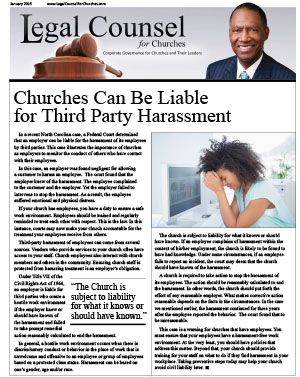In a recent North Carolina case, a Federal Court determined that an employer can be liable for the harassment of its employees by third parties. This case illustrates the importance of churches as employers to monitor the conduct of others who have contact with their employees.
In this case, an employer was found negligent for allowing a customer to harass an employee. The court found that the employer knew of the harassment. The employee complained to the customer and the employer. Yet the employer failed to intervene to stop the harassment. As a result, the employee suffered emotional and physical distress.
If your church has employees, you have a duty to ensure a safe work environment. Employees should be trained and regularly reminded to treat each other with respect. This is the law. In this instance, courts may now make your church accountable for the treatment your employees receive from others.
Third-party harassment of employees can come from several sources. Vendors who provide services to your church often have access to your staff. Church employees also interact with church members and others in the community. Ensuring church staff is protected from harassing treatment is an employer’s obligation.
Under Title VII of the Civil Rights Act of 1964, an employer is liable for third parties who create a hostile work environment if the employer knew or should have known of the harassment and failed to take prompt remedial action reasonably calculated to end the harassment.
In general, a hostile work environment occurs when there is discriminatory conduct or behavior in the place of work that is unwelcome and offensive to an employee or group of employees based on a protected class status. Harassment can be based on one’s gender, age and/or race.
The church is subject to liability for what it knows or should have known. If an employee complains of harassment within the context of his/her employment, the church is likely to be found to have had knowledge. Under some circumstances, if an employee fails to report an incident, the court may deem that the church should have known of the harassment.
A church is required to take action to stop the harassment of its employees. The action should be reasonably calculated to end the harassment. In other words, the church should put forth the effort of any reasonable employer. What makes corrective action reasonable depends on the facts in the circumstances. In the case we mentioned earlier, the harassment continued for three years after the employee reported the behavior. The court found that to be unreasonable.
This case is a warning for churches that have employees. You must ensure that your employees have a harassment-free work environment. At the very least, you should have policies that address this matter. Beyond that, your church should provide training for your staff on what to do if they find harassment in your workplace. Taking preventive steps today may help your church avoid civil liability later.

